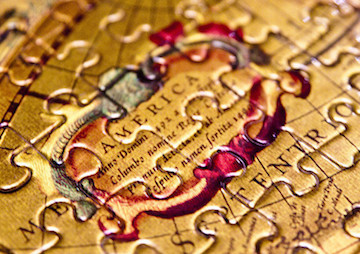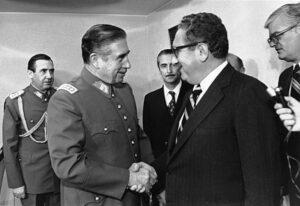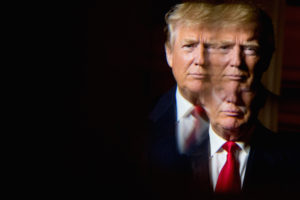Where Did the American Century Go?
If huge swaths of the world have begun to disintegrate in an era when minority insurgencies and terror outfits are the worst opponents the U.S. faces, consider what chaos could come to regions where a potentially hostile power remains. Ken Hawkins / CC-BY-2.0
1
2
3
Ken Hawkins / CC-BY-2.0
1
2
3
Vladimir Putin recently manned up and admitted it. The United States remains the planet’s sole superpower, as it has been since the Soviet Union collapsed in 1991. “America,” the Russian president said, “is a great power. Today, probably, the only superpower. We accept that.”
Think of us, in fact, as the default superpower in an ever more recalcitrant world.
Seventy-five years ago, at the edge of a global conflagration among rival great powers and empires, Henry Luce first suggested that the next century could be ours. In February 1941, in his magazine LIFE, he wrote a famous essay entitled “The American Century.” In it, he proclaimed that if only Americans would think internationally, surge into the world, and accept that they were already at war, the next hundred years would be theirs. Just over nine months later, the Japanese attacked the U.S. fleet at Pearl Harbor, plunging the country into World War II. At the time, however, Americans were still riven and confused about how to deal with spreading regional conflicts in Europe and Asia, as well as the rise of fascism and the Nazis.
That moment was indeed a horrific one, and yet it was also just a heightened version of what had gone before. For the previous half-millennium, there had seldom been a moment when at least two (and often three or more) European powers had not been in contention, often armed and violent, for domination and for control of significant parts of the planet. In those many centuries, great powers rose and fell and new ones, including Germany and Japan, came on the scene girded for imperial battle. In the process, a modern global arms race was launched to create ever more advanced and devastating weaponry based on the latest breakthroughs in the science of war. By August 1945, this had led to the release of an awesome form of primal energy in the first (and thus far only) use of nuclear weapons in wartime.
In the years that followed, the United States and the Soviet Union grew ever more “super” and took possession of destructive capabilities once left, at least in the human imagination, to the gods: the power to annihilate not just one enemy on one battlefield or one armada on one sea but everything. In the nearly half-century of the Cold War, the rivalry between them became apocalyptic in nature as their nuclear arsenals grew to monstrous proportions. As a result, with the exception of the Cuban Missile Crisis, they faced off against each other indirectly in “limited” proxy wars that, especially in Korea and Indochina, were of unparalleled technological ferocity.
Then, in 1991, the Soviet Union imploded and, for the first time in historical memory, there was only one power that mattered. This was a reality even Henry Luce might have found farfetched. Previously, the idea of a single power so mighty that it alone loomed over the planet was essentially relegated to fictional fantasies about extraordinary evil. And yet so it was — or at least so it seemed, especially to the leadership that took power in Washington in the year 2000 and soon enough were dreaming of a planetary Pax Americana.
In a strange way, something similarly unimaginable happened in Europe. On that continent laid waste by two devastating twentieth-century wars, a single “union” was formed, something that not so long before would have been categorized as a madly utopian project. The idea that centuries of national rivalries and the rabid nationalism that often went with it could somehow be tamed and that former great powers and imperial contenders could be subsumed in a single peaceful organization (even if under the aegis of American global power) would once have seemed like the most absurd of fictions. And yet so it would be — or so it seemed, at least until recently.
A Planetary Brexit?
We seldom take in the strangeness of what’s happened on this curious planet of ours. In the years after 1991, we became so inured to the idea of a single superpower globe and a single European economic and political union that both, once utterly inconceivable, came to seem too mundane to spend a lot of time thinking about. And yet who would have believed that 75 years after Luce urged his country into that American Century, there would, in military terms, be no genuine rivals, no other truly great powers (only regional ones) on Planet Earth?
So many taken-for-granted things about our world were considered utterly improbable before they happened. Take China. I recall well the day in 1972 when, after decades of non-contact and raging hostility, we learned that President Richard Nixon and his national security adviser, Henry Kissinger, were in Beijing meeting congenially with Communist leader Mao Zedong. A friend called to tell me the news. I thought he was joking and it struck me as a ridiculously lame joke at that.
There’s almost no way now to capture how improbable this seemed at the time — the leading communist revolutionary on the planet chatting cheerily with the prime representative of anti-communism. If, however, you had told me then that, in the decades to come, China would undergo a full-scale capitalist revolution and become the economic powerhouse of the planet, and that this would be done under the leadership of Mao’s still regnant communist party, I would have considered you mad.
And mind you, that’s just to begin to mention the improbabilities of the present moment. After all, in what fantasies — ever — about a globe with a single dominant power, would anyone have imagined that it might fail so utterly to bring the world to anything approximating heel? If you had told Henry Luce, or me, or anyone else, including the masters of the universe in Washington in 1991, that the only superpower left on Earth, with the best-funded, mightiest, most technologically destructive and advanced military imaginable, would, on September 11, 2001, be goaded by a group so modest in size and power as to be barely noticeable into a series of never-ending wars across the Greater Middle East and Africa, we would have found that beyond improbable.
Your support matters…Independent journalism is under threat and overshadowed by heavily funded mainstream media.
You can help level the playing field. Become a member.
Your tax-deductible contribution keeps us digging beneath the headlines to give you thought-provoking, investigative reporting and analysis that unearths what's really happening- without compromise.
Give today to support our courageous, independent journalists.







You need to be a supporter to comment.
There are currently no responses to this article.
Be the first to respond.